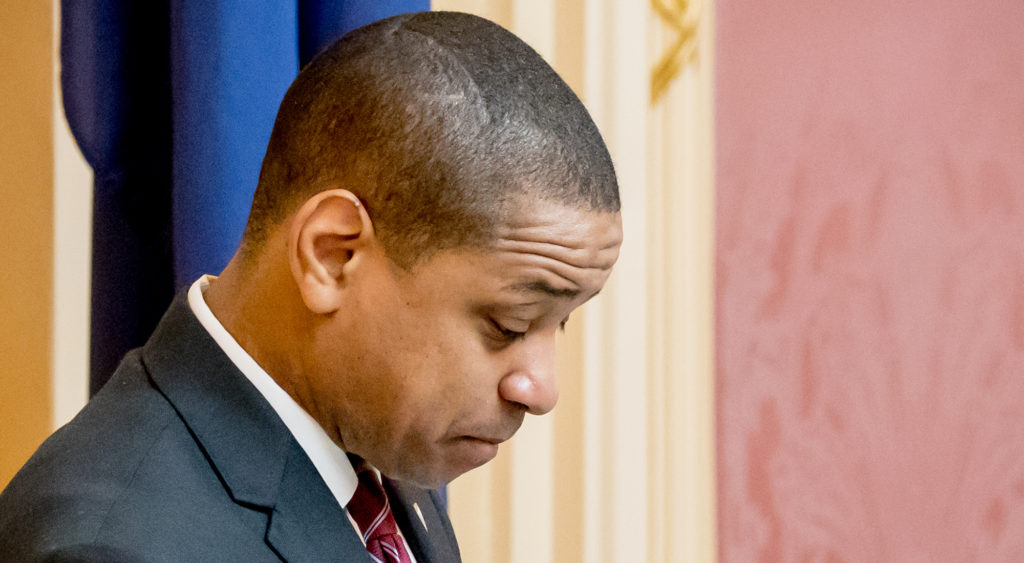Embattled Virginia Lieutenant Governor Justin Fairfax wants to clear his name against two allegations of sexual assault, which he strongly denies.
Yesterday, Democrats backed away from a plan by Delegate Patrick Hope (D-Arlington) to initiate impeachment proceedings against Fairfax, a move which Hope said would provide a venue for investigating allegations of criminal conduct which allegedly occurred out of state.
Fairfax, however, has taken a different approach, calling for the FBI to investigate the accusations against him.
“As an officer of the court and a former federal prosecutor, I have dedicated my life to the law and due process,” Fairfax said in a statement, reported the Washington Post.
“Consequently, I call on all appropriate and impartial investigatory authorities, including the FBI, to investigate fully and thoroughly the allegations against me by Ms. Watson and Dr. Tyson.”
From day one, the scandal has drawn comparisons with the confirmation hearings of Supreme Court Justice Brett Kavanaugh, as the latest extension of the nationwide #MeToo movement to confront powerful people for past transgressions involving sexual assault and harassment.
So too did Fairfax’s call for an FBI investigation, which featured prominently in the closing days of the Kavanaugh fight on Capitol Hill.
However, Fairfax failed to note one key difference: the FBI has no jurisdiction or statutory authority to investigate state crimes which do not involve a federal office.
More perplexing is why Fairfax, a former federal prosecutor, would call for an FBI investigation which cannot happen.
Fairfax served as an assistant United States attorney (AUSA) from 2010 through 2012, before he resigned his position to launch a failed bid for the Democratic nomination for attorney general in 2013.
Despite his short record as a prosecutor, Fairfax did try cases, and in doing so, worked closely with the FBI on the cases brought before him.
Many commentators have made light of the apparent contradiction, asking whether Fairfax knew then, and if so, then why he would call for an investigation which the FBI cannot conduct.
“The FBI has no jurisdiction to investigate rape and sexual assault claims,” tweeted former Department of Justice Inspector General Michael Bromwich, who served as an AUSA in the Southern District of New York. “There is no federal hook — the alleged crimes didn’t occur on federal property and Fairfax is not a Supreme Court nominee. Fairfax and his lawyers surely know this”
Bromwich’s assessment reflects the role of the FBI, which the agency describes as follows:
“Federal law gives the FBI authority to investigate all federal crime not assigned exclusively to another federal agency (28, Section 533 of the U.S. Code). Title 28, U.S. Code, Section 533, authorizes the attorney general to appoint officials to detect and prosecute crimes against the United States. Title 18, U.S. Code, Section 3052, specifically authorizes special agents and officials of the FBI to make arrests, carry firearms, and serve warrants. Title 18, U.S. Code, Section 3107, empowers special agents and officials to make seizures under warrant for violation of federal statutes. The FBI’s authority to investigate specific criminal violations is conferred by numerous other congressional statutes—such as the Congressional Assassination, Kidnapping, and Assault Act (Title 18, U.S. Code, Section 351). The FBI has special investigative jurisdiction to investigate violations of state law in limited circumstances, specifically felony killings of state law enforcement officers (28 U.S.C. § 540), violent crimes against interstate travelers (28 U.S.C. § 540A0), and serial killers (28 U.S.C. §540B).”
In addition, the FBI, pursuant to statutory authorization, may also investigate nominees for federal office, as well as other federal officials which Congress has declared within the agency’s investigative scope.
That does not include a state office holder, such as Justin Fairfax.
Geoff Bennett, with NBC News, received word that the FBI would not investigate the matter for lack of jurisdiction.
“A law enforcement official tells @PeteWilliamsNBC the FBI is not looking into the two sexual assault allegations against Virginia Lt. Gov. Justin Fairfax, because it has no jurisdiction to do so,” he reported.
Ben Tribbett, a seasoned Democratic consultant in Virginia, offered a slightly different take, speaking to the backroom maneuvering which many Democrats, Fairfax included, have alleged is behind the initial release of the first allegation.
Fairfax previously insinuated that Democrats loyal to Governor Ralph Northam leaked the accusation for political purposes.
“Interesting take from Paul Goldman here- given that the FBI can not investigate state crimes and @joshscampbell’s reiteration of that last night- is Justin Fairfax’s call for the FBI investigation really a back door attempt to try to get feds investigating @LevarStoney? WTF?” he tweeted.
In his tweet, Tribbett referenced a post by Paul Goldman, a veteran Democratic strategist.
“Why did LG Fairfax ask for an FBI investigation when he knows as a former federal guy the FBI doesn’t investigate alleged state crimes,” wondered Goldman.
“Consider this: Because this may be the only way to get an investigation into Fairfax’s claim that Northam, Stoney, their aides, other DEMs were spreading stuff on him…and demanding he resign without a hearing.”
Fairfax has not elaborated on his call for an FBI investigation, nor has he offered any indication why he believes the agency has jurisdiction to look into the allegations against him.
As the scandal continues, the call for an investigation, which many say is an attempt at deflection, is sure to continue prompting questions into why a former federal prosecutor would ask a federal agency with which he worked to investigate a matter outside its jurisdiction.

